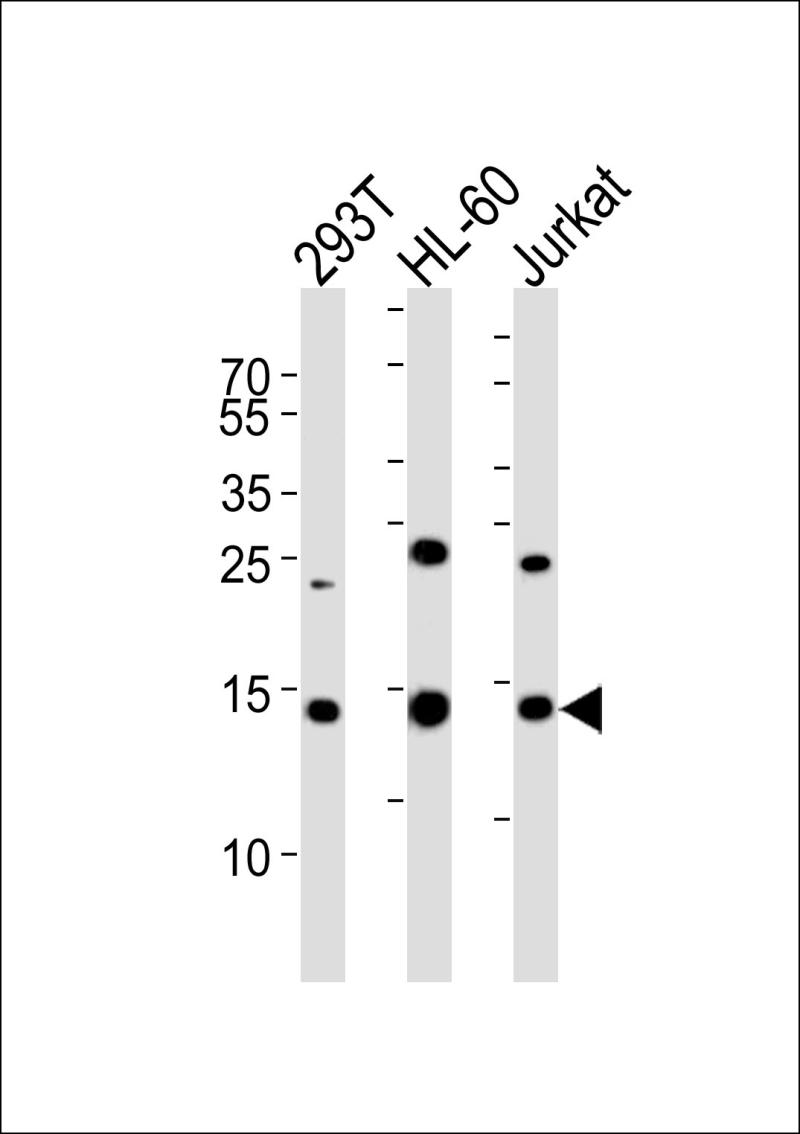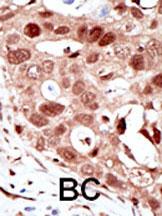



| WB | 1/1000 | Human,Mouse,Rat |
| IF | 咨询技术 | Human,Mouse,Rat |
| IHC | 1/100-1/500 | Human,Mouse,Rat |
| ICC | 技术咨询 | Human,Mouse,Rat |
| FCM | 咨询技术 | Human,Mouse,Rat |
| Elisa | 咨询技术 | Human,Mouse,Rat |
| Aliases | Small ubiquitin-related modifier 2, SUMO-2, HSMT3, SMT3 homolog 2 {ECO:0000312|HGNC:HGNC:11125}, SUMO-3, Sentrin-2, Ubiquitin-like protein SMT3B, Smt3B, SUMO2 (HGNC:11125) |
| Entrez GeneID | 6613 |
| WB Predicted band size | 10.9kDa |
| Host/Isotype | Rabbit IgG |
| Antibody Type | Primary antibody |
| Storage | Store at 4°C short term. Aliquot and store at -20°C long term. Avoid freeze/thaw cycles. |
| Species Reactivity | Human, Mouse, Rat |
| Immunogen | This SUMO2 antibody is generated from rabbits immunized with a KLH conjugated synthetic peptide between 63-93 amino acids from the C-terminal region of human SUMO2. |
| Formulation | Purified antibody in PBS with 0.05% sodium azide,1%BSA and 50% glycerol.prepared by Saturated Ammonium Sulfate (SAS) . |
+ +
以下是关于SUMO2抗体的3篇参考文献示例(注:部分文献信息为示例性质,实际引用时请核实准确性):
1. **文献名称**: "SUMO2 modification of PTEN regulates neuronal apoptosis"
**作者**: Wang et al.
**摘要**: 该研究利用特异性SUMO2抗体,通过免疫共沉淀和Western blot技术,揭示了PTEN蛋白在神经元中的SUMO2修饰机制,并证明此修饰通过调控Akt信号通路影响细胞凋亡。
2. **文献名称**: "Distinct roles of SUMO1 and SUMO2/3 in protein quality control"
**作者**: Vertegaal et al.
**摘要**: 文章通过比较SUMO1和SUMO2/3抗体的特异性,发现SUMO2/3修饰主要参与错误折叠蛋白的泛素化降解途径,而SUMO1修饰更多参与核转运过程,突显了SUMO2抗体的功能研究价值。
3. **文献名称**: "A monoclonal antibody specifically targeting SUMO2 for imaging and therapeutic applications"
**作者**: Li et al.
**摘要**: 研究团队开发了一种高特异性SUMO2单克隆抗体,验证其在免疫荧光和流式细胞术中的应用,并探索其在癌症模型中对SUMO2过表达肿瘤细胞的靶向治疗潜力。
4. **文献名称**: "Global analysis of SUMO2 substrates in response to proteotoxic stress"
**作者**: Hendriks et al.
**摘要**: 通过SUMO2抗体结合质谱技术,系统性鉴定了热休克应激下细胞内SUMO2修饰的底物谱,揭示了SUMOylation在应激反应中的动态调控网络。
(注:以上文献信息为示例,建议通过PubMed或Google Scholar以关键词“SUMO2 antibody”检索真实文献。)
**Background of SUMO2 Antibody**
SUMO2 (Small Ubiquitin-like Modifier 2) is a member of the SUMO protein family, which regulates post-translational modifications critical for cellular processes such as nuclear transport, transcriptional regulation, DNA repair, and stress response. Unlike SUMO1. SUMO2 shares high homology with SUMO3 (~95%), forming a distinct subgroup that preferentially forms polymeric chains (poly-SUMOylation) on target proteins. This modification often occurs under stress conditions (e.g., heat shock, oxidative stress) and influences protein stability, localization, or interactions.
SUMO2 antibodies are essential tools for detecting SUMO2-conjugated proteins in techniques like Western blotting, immunofluorescence, or immunoprecipitation. These antibodies help elucidate SUMO2-specific roles, particularly in stress adaptation, cell cycle control, and neurodegenerative or cancer-related pathways. Specificity is a key consideration, as SUMO2/3 antibodies must distinguish between SUMO paralogs and avoid cross-reactivity with SUMO1. Validation using knockout cells or competitive peptides is often required.
Research highlights SUMO2's involvement in dynamic processes like the DNA damage response, where it modulates repair proteins, and in forming nuclear stress bodies. Its unique ability to form poly-chains also differentiates its functional impact from monomeric SUMO1 modifications. Dysregulation of SUMO2 pathways is linked to diseases, making its study and associated antibodies vital for therapeutic exploration.
×